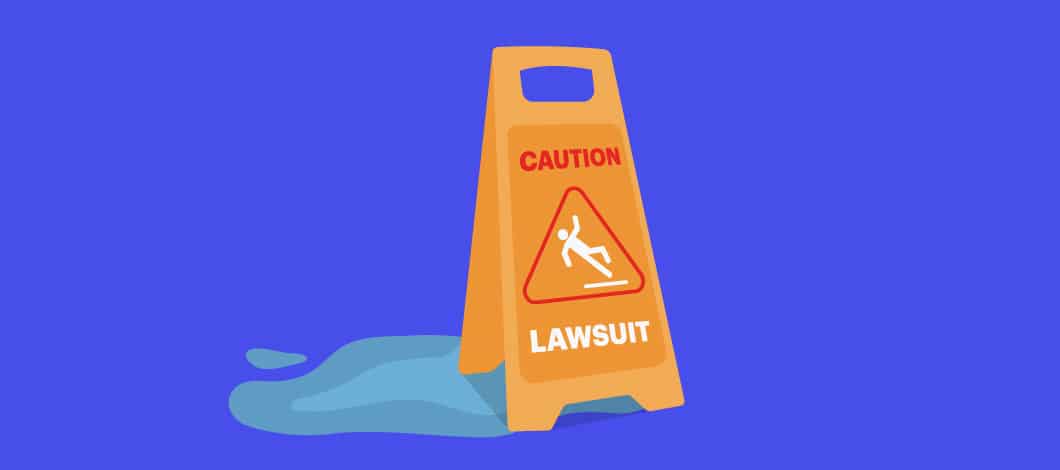Over the years, cases involving big-name companies have often made the news. Remember when Subway was sued for false advertising regarding their foot-long sub that was just shy of 12 inches? Or how about the McDonald’s hot coffee lawsuit?
In most cases, a lawsuit is filed because one party feels they’ve been wronged by the other, either physically, emotionally, socially or financially. And lawsuits in business happen all the time. While this reality assures job security in the legal profession, it does little to ease entrepreneurs worried about what the future might hold for them.
In this post, we’ll take a look at common business lawsuits, ways to avoid a business lawsuit and how to protect your business from being sued.
6 Common Lawsuits Against Businesses
According to data reported on Statista, 79% of companies polled had at least 1 lawsuit filed against them in the previous year. Specifically, 31% reported between 1-5 lawsuits, 21% indicated they had 6-20 and 27% had more than 21. Here are some of the most common lawsuits against businesses.
1. Employee Matters
Business lawsuit cases involving employees can include charges of workplace discrimination, injury on the job, wrongful termination or a hostile work environment (e.g., harassment), for example.
One of the most common business lawsuits stems from staff, according to David Reischer, employment attorney and CEO of LegalAdvice.com. Reischer states: “As a small business owner, disgruntled employees will be one of the most common legal headaches.”
Reischer goes on to say, “A properly drafted employment contract is a safeguard that every small business needs to protect the business against a lawsuit by an employee. A small business needs to have legally binding employee contracts for different types of employees, including full-time, part-time and any outside independent contractors. These contracts need to stipulate payment, termination clauses, rights and responsibilities of the employee and anything else deemed important.”
“A properly drafted employment contract,” Reischer notes, “will serve to protect a small business owner in the event an employee sues for discrimination or a myriad of other reasons. The terms of the employment contract set out the scope and expectations of the relationship for all parties, and it is the first line of defense in the event an employer is sued at a later date by an employee.”
If a lawsuit is due to injury or illness tied to an employee’s job or that occurred on the job, workers’ compensation insurance, which is required for most businesses, should kick in. Workers’ comp covers medical bills, lost wages and other expenses stemming from the work-related injury.
Businesses could also be sued if an employee causes an accident while operating a company vehicle.
2. Customer Dissatisfaction With a Product or Service
Sometimes, customers will wage business lawsuits on companies when they feel that a product or service they purchased differs from what they thought they’d be getting. Making guarantees you can’t keep, inaccurately advertising your product or overpromising quality or efficacy could put your company at risk to be sued. Reduce the threat of a lawsuit by being cautious with your actions and communications, whether promotional, online or in person.
One example is a 2007 business lawsuit case in which a dry cleaning customer filed a lawsuit alleging the dry cleaners misplaced his pants, basing his complaint on a sign in the store reading “Satisfaction Guaranteed.” The outcome? The plaintiff lost the lawsuit and was ordered to pay the dry cleaner’s legal fees.
3. Discrimination Against Customers
Prejudicial and unfair treatment of a particular individual forms the basis of another type of lawsuit against small business owners. Depending on the state, these lawsuits can center on discrimination based on one or more of the following: race, gender, sexual orientation, national origin, disability, familial status or religion, or a combination thereof.
In 1994, restaurant chain Denny’s was sued for reported discrimination against Black customers. Thousands of Black patrons indicated they were charged more, asked to pay in advance of their meal, refused service or forced to endure long wait times for seating while white customers were served first. Ultimately, Denny’s settled and paid $54.4 million in damages.
4. Slip-and-Fall Accidents
Forgetting to put a “Wet Floor” sign out after just having mopped your store floor could put you at risk, for example. If a customer walks by the area and doesn’t know to heed caution, a simple walk to the restroom or fitting room could turn into a trip to the emergency room. Icy walkways, greasy floors, exposed objects that can cause trips are some other instances that could provoke this kind of lawsuit.
Whether you recognized the issue and failed to act to correct it or you did something to cause the slip-and-fall, you could be found at fault.
Wal-Mart was sued in 2007 when a truck driver slipped in grease while making a delivery. The driver injured her shoulder and neck and ruptured a spinal disc. The fall caused the driver chronic pain and made it unable for her to return to work. This slip-and-fall case went before the courts, and the plaintiff was awarded $15 million in damages.
5. Breach of Contract
When one party fails to honor the terms of a contractual agreement, a breach of contract has occurred. Examples of a breach of contract include not adhering to agreed-upon dates and times, services to be provided or pricing.
One famous case pitted Macy’s against Martha Stewart Living Omnimedia in 2012. Macy’s claimed it had a relationship with the Martha Stewart company to be the exclusive manufacturer and seller of certain products in the line. The breach of contract came about when Martha Stewart partnered with J.C. Penney to sell her products there too. In the end, Macy’s benefitted from an undisclosed settlement.
Similarly, in a case that took 4 years to settle, Netflix filed a breach-of-contract complaint against Relativity Media. Several of the films the defendant allegedly licensed exclusively to Netflix under a multiyear contract appeared on competitor outlets.
Netflix sought to collect millions in damages. In a turn of events, however, the terms of the settlement required Netflix to pay millions to Relativity for fees it withheld from the studio after the breach of contract was declared. Netflix would also drop all claims and objections.
6. Intellectual Property Rights Violations
Another common business lawsuit involves one party infringing on another’s copyright, trademark, patent or trade secret. A logo, design, invention, formula, business name and proprietary image are examples of items that could fall under the protection of intellectual property rights.
In the late ‘90s, the Recording Industry Association of America sued Napster, an online platform that allowed users to upload, download and share music files for free. Napster lost the business lawsuit and was forced to shut down its free site. The company was proved to be in the wrong because it didn’t own the rights to the songs and was not paying licensing fees to facilitate the distribution of the music.

How to Protect Your Business From Lawsuit
We live in a litigious society. Even with preventative measures, your small business could still be the object of a lawsuit. That said, there are steps you can take to protect your business from being sued and avoid becoming a small business lawsuit statistic.
Thomas Simeone, personal injury attorney at Simeone & Miller, LLP, offers the following advice: “There are three key things a small business can and should do to protect itself from a lawsuit. First, obtain sufficient liability insurance. The coverage should be enough to handle the maximum claim against the company. To increase the amount of coverage and reduced [sic] your premium, explore options like raising deductibles. Insurance is asset protection, and the best way to protect assets is to have enough coverage to pay claims against you.”
-
Types of Business Insurance Coverage
In addition to worker’s compensation insurance, business owners should consider the following types of insurance:
- General liability policy
- Professional liability or malpractice insurance
- Property coverage
- Errors and omissions insurance
- Auto policy for vehicles driven by employees
- Equipment insurance
- Directors and officers coverage
- Employment practices liability
- Cyber liability coverage
Speak with an insurance broker to discuss what types of insurance your business would benefit from and to make sure you have sufficient coverage to protect yourself in the event of a lawsuit.
Simeone goes on to say, “Second, a business should incorporate or operate as a legal entity that has limited liability. This ensures that the assets of any partners or investors cannot be used to satisfy a judgment. Once a company does that, it is smart to distribute assets, including cash, that is not needed to operate the business to the owners. Every asset that the company itself owns can be reached by a lawsuit.”
“Finally, if a claim is made against the company, consult with an attorney and/or contact your insurance company, which may provide you with an attorney, immediately,” states Simeone.
Contacting your insurance carrier is important to determine if they will cover the claim. If you don’t make your insurance carrier aware of the claim, they could decline coverage.
If your business is currently being sued, there are steps you can take to mitigate the damage too. Seek legal advice from a reputable attorney with experience representing defendants in similar suits.











